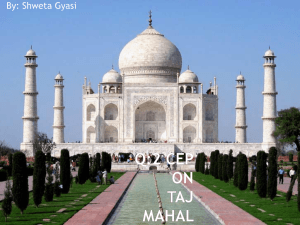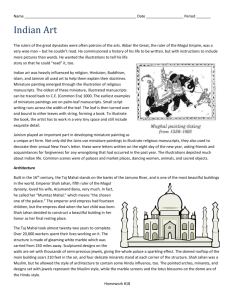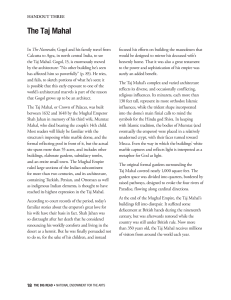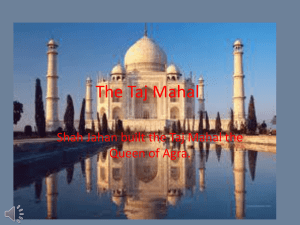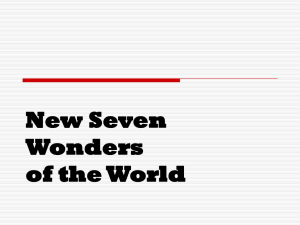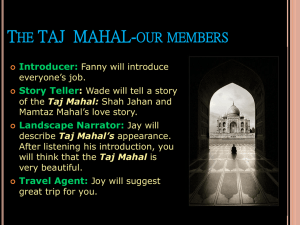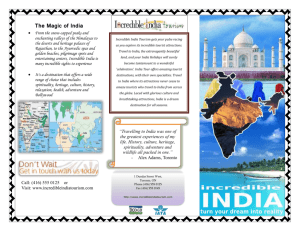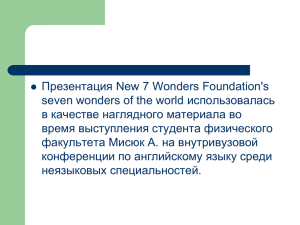India
advertisement
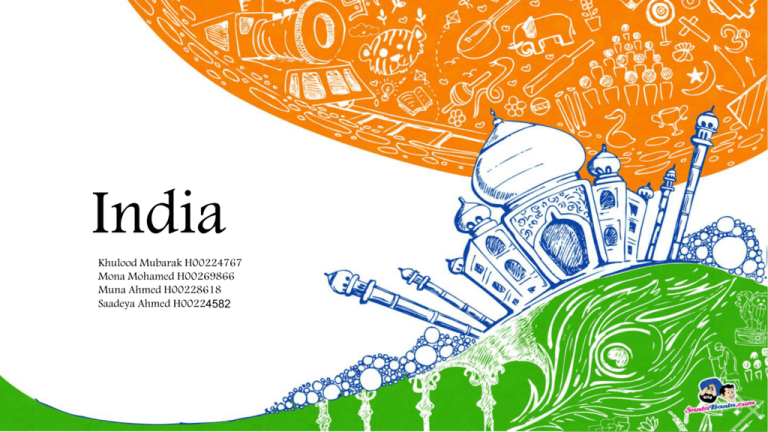
India Khulood Mubarak H00224767 Mona Mohamed H00269866 Muna Ahmed H00228618 Saadeya Ahmed H00224582 Outline General Information about the country Classification of the culture Customs Body language A proverb from this country An object typical of the culture Famous building in that country General Information Geography New Delhi (13 million people) Seventh largest country in the world Most populous country after China (one billion) Agricultural country Languages: Hindi (the official language) Religion: Hinduism (80%) and the Muslim religion (10%) President: Pranab Mukherjee High Context Culture ► Gender roles clearly defined Women never eat before men, except they be the children or inferiors. ► Elders/authoritative people in control Older people are treated with great respect in India. When greeting an elder, some Indians may touch their feet as a sign of respect. ► Team work preferred People typically define themselves by the groups to which they belong rather than by their status as individuals. ► Expertise valued In schools, teachers are called gurus and are viewed as the source of all knowledge. ► sense of respect and honor This is a hierarchical culture, so greet the eldest or most senior person Comes first. Business Meeting Etiquette Best time for a meeting. Arrive at meetings on time. Meetings will start with a great deal of getting-toknow-you talk. Business Card Exchange Exchanged after the initial handshake and greeting. If you have a university degree or any honor, put it on your business card. Right hand to give and receive business cards. Greetings When leaving a group, each person must be bid farewell individually. Shaking hands is common. Men may shake hands with other men and women may shake hands with other women. Business Dress Code Men should wear dark colored conservative business suits. Women should dress conservatively in suits or dresses. The weather often determines clothing. In the hotter parts of the country. Gift Giving Etiquette It is not necessary to bring a gift. In happy day don't give (frangipani or white flowers). Use the lucky colors. Hindus should not be given gifts made of leather. Muslims should not be given gifts made of pigskin or alcoholic products. Gifts are not opened when received. Body language considered offensive Indian proverb வெளுத்தவதல்லாம் பாலல்ல / மின்னுெவதல்லாம் வபான்னல்ல (Tamil) Transliteration: Veluthathellam Paal alla. All the things that are white are not milk. English Equivalent: All that glitters is not gold. Sindoor Tradition Red or orange-red colored cosmetic powder. Worn by married women Parting of women’s hair. The red Sindoor was made at home from turmeric and alum. Famous building Taj Mahal Mean Taj Mahal means crown palace. It was the grave of Mumtaz Taj Mahal means crown palace. It was the grave of Mumtaz Mahal atthe thelower lower chamber and ofthe Mahal at chamber, the grave Shah Jahan was added to it later grave of Shah Jahan was added to it later. Information Taj Mahal is regarded as one of the seven wonders of the world. The king Shah jahan built Taj Mahal and he was a Muslim. Construction of the Taj 22 years (1632-1653) Cost 40 million rupees located in Agra, India Taj Mahal of India “The Epitome of love” When the Empress (Mumtaz Mahal) the Emperor's wife (Shah Jahan) was dying, she requested her husband to Achieves her after her death two wishes: one is to not marry another woman in order to prevent conflicts between his children to inherit the throne, and the other is to build on top of her grave a huge building. The Red Fort The Red Fort dates back to the 10th century. Started in 1565, it took eight years to build. The king Shah Jahan built the Red Fort. It was to become known as Akbar the Great. started as a simple mud and brick fortress on the banks of the River Yamuna. It was one of the largest fortified residences of the Mughal Empire, with over 500 buildings. Famous desserts Jlab Jumbo: one of the famous Indian sweet that they give it on Eid Fitr and Aladha. Famous desserts Ras Malai: much is known and which is one of the most delicious cups desserts. Famous desserts Lado: usually they offers Lado in weddings and religious events. References Barrow, M. (2013). Quick Facts about India. Retrieved from primaryhomeworkhelp: http://www.primaryhomeworkhelp.co.uk/india/general.htm Famouse Historic Building. (n.d.). Retrieved from famous-historic-buildings: http://www.famous-historicbuildings.org.uk/india_14.html India Culture Guide. (n.d.). Retrieved from Infosys: https://sites.google.com/a/global.t-bird.edu/india-cultureguide/doing-business-in-india/body-language Indian proverbs. (2014, November 22). Retrieved from wikiquote: http://en.wikiquote.org/wiki/Indian_proverbs kwintessential. (2014). India - Language, Culture, Customs and Etiquette. Retrieved from kwintessential: http://www.kwintessential.co.uk/resources/global-etiquette/india-country-profile.html kwintessential. (2014). kwintessential. Retrieved from kwintessential: http://www.kwintessential.co.uk/resources/global-etiquette/india-country-profile.html References Murugappan St, S. (n.d.). Sindoor. Retrieved from primaryinfo: http://www.primaryinfo.com/scope/sindoor.htm NYC. (2003). Indian Stock Photos. Retrieved from shutterstock: http://www.shutterstock.com/s/indian/search.html RANDOMFACTS. (2007). Retrieved from randomhistory: http://facts.randomhistory.com/2009/07/21_india.html Shakespeare Club House. (1900, January 18). WOMEN OF INDIA. Retrieved from ramakrishnavivekananda: http://www.ramakrishnavivekananda.info/vivekananda/volume_8/lectures_and_discourses/women_of_indi a.htm Thinkstock. (2015). thinkstockphotos. Retrieved from thinkstockphotos: http://www.thinkstockphotos.co.uk/image/stock-illustration-set-of-color-bows/467474475 UNESCO World Heritage Centre. (1992). Taj Mahal. Retrieved from unesco: http://whc.unesco.org/en/list/252
